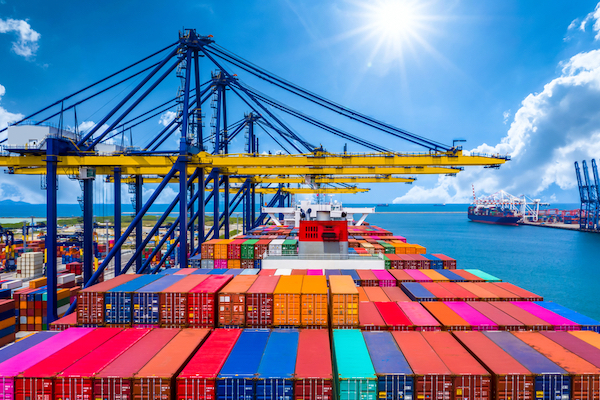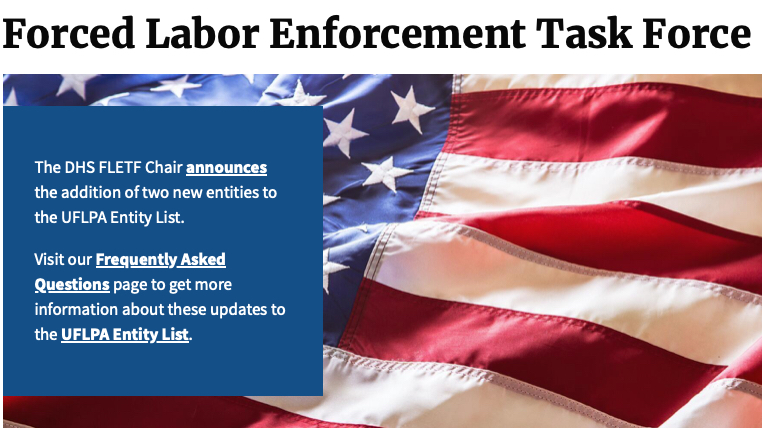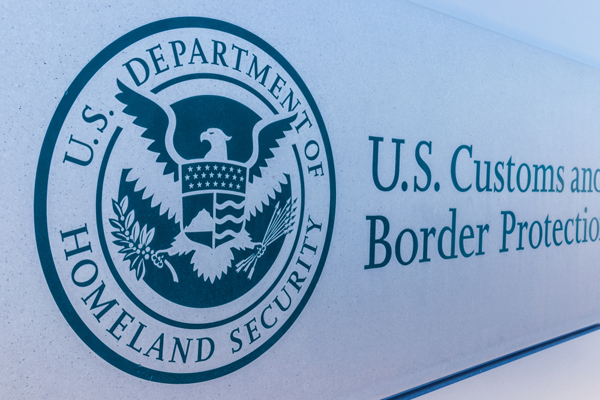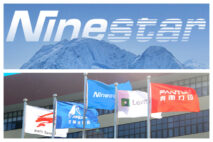After it was determined that Ninestar Corporation and eight of its subsidiaries had violated the Uyghur Forced Labor Prevention Act (UFLPA), the U.S. Department of Homeland Security (DHS) announced on June 9 that goods from the companies would be restricted from entering U.S. ports (see “Ninestar Imports Banned by U.S. Government Due to Forced Labor Concerns”). As a result, many of the products produced by the world’s largest third-party supplies manufacturer are now banned from being imported into the United States, including consumables for use in printers and MFPs from most OEMs along with certain key ink and toner cartridge components and a range of printer hardware.
The ban came after the Forced Labor Enforcement Task Force (FLETF), an interagency group led by DHS, placed the Ninestar firms in question on what is known as the UFLPA Entity List. Any organization on the UFLPA Entity List is presumed to have violated Section 307 of the Tariff Act of 1930 prohibiting products made with forced labor, which it defined as: “All work or service which is exacted from any person under the menace of any penalty for its nonperformance and for which the worker does not offer himself voluntarily.” The language in the definition originated with the International Labour Organization, a United Nations agency, and is used by various countries to identify forced labor.
Visitors to this website know that we closely follow restrictions placed on the importation and sale of digital imaging products in the United States resulting from orders from the federal courts or the U.S. International Trade Commission (ITC). The UFLPA is new to us, however. Signed into law in December 2021 by U.S. President Joe Biden, the UFLPA went into effect on June 21, 2022, less than a year before the Ninestar firms were place on the UFLPA Entity List. To better understand this relatively new statute, we researched the UFLPA, and we share some of that research below as part of our ongoing coverage of the situation.
Note that we are neither attorneys nor experts in international trade law. We also do not wish to engage in political debate or commentary about tensions between China and the United States or mistreatment of Uyghurs and other minority groups within the People’s Republic of China (PRC) and its so-called autonomous regions. What follows is our understanding of the UFLPA and how it works along with our analysis of how it may impact Ninestar, its subsidiaries, and the broader market for digital imaging hardware and supplies.
UFLPA and Rebuttable Presumption
When the U.S. State Department announced the implementation of the UFLPA last year, U.S. Secretary of State Anthony Blinken indicated in a prepared statement that “genocide and crimes against humanity are ongoing” in China’s Xinjiang Uyghur Autonomous Region (Xinjiang). He called on the PRC government to “immediately end atrocities and human rights abuses, including forced labor.”
To hasten the end to these abuses, the UFLPA was enacted to prevent goods produced in Xinjiang or sourced from the region from entering the United States. The ban applies to all entities working with the Xinjiang government or the Xinjiang Production and Construction Corps, a state-owned enterprise that oversees policing, prisons, healthcare, and other public services in the region and holds stakes in a range of publicly traded companies. The UFLPA also restricts the importation of “products made by Uyghurs, Kazakhs, Kyrgyz, Tibetans, or members of other persecuted groups through forced labor” in other parts of the PRC.
A key component of the UFLPA is that it establishes a “rebuttable presumption” that forced labor has been used in the production of “goods mined, produced, or manufactured wholly or in part in Xinjiang or by an entity on the UFLPA Entity List.” According to Black’s Law Dictionary, a rebuttable presumption is a “legal presumption which holds good until disproved.” Under the UFLPA, a rebuttable presumption extends to any product that incorporates goods produced in Xinjiang or by firms on the UFLPA Entity List that are manufactured in other parts of China or in other countries.
The use of a rebuttable presumption of forced labor is not exclusive to the UFLPA nor to goods exported from China. Currently, for example, a rebuttable presumption of forced labor is in place for all goods manufactured in North Korea and these products are thus banned from the United States.
The UFLPA Entity List
As noted earlier, the Forced Labor Enforcement Task Force or FLETF placed Ninestar and eight of its subsidiaries on the UFLPA Entity List in June. As a result, the rebuttable presumption of forced labor was applied to all the products that the companies manufacture, including printers and MFPs, ink and toner cartridges, semiconductors, and more. And this is the reason why products from Ninestar and its named subsidiaries can no longer be exported to the United States.
The FLETF was established in 2020 as part of the United States-Mexico-Canada Agreement (USMCA), which replaced the North American Free Trade Agreement (NAFTA). As part of its larger responsibility of preventing all goods from entering the United States that are made in whole or in part with forced labor, the FLETF is charged with maintaining the UFLPA Entity List. Led by DHS, the FLETF is made up of voting members from the Office of the U.S. Trade Representative and the Departments of Commerce, Justice, Labor, State, and Treasury. Additional agencies such as U.S. Customs and Border Protection (CBP) and the National Security Council (NSC) along with other governmental groups also support the FLETF.
Companies placed on the UFLPA Entry List fall into one of four categories:
- Entities in Xinjiang that “mine, produce, or manufacture wholly or in part any goods, wares, articles, and merchandise with forced labor.”
- Entities working with the Xinjiang government “to recruit, transport, transfer, harbor or receive forced labor or Uyghurs, Kazakhs, Kyrgyz, or members of other persecuted groups” out of the region.
- Entities exporting products from the PRC to the United States produced by the two groups above.
- Facilities and entities, including the Xinjiang Production and Construction Corps, that source material from Xinjiang or from persons working with the Xinjiang government or the Xinjiang Production and Construction Corps to support ‘‘poverty alleviation’’ programs or the ‘‘pairing-assistance’’ programs or any other government-labor scheme that uses forced labor.
The Ninestar companies are in the second group of organizations on the UFLPA Entity List. While it’s not clear exactly where or how the forced labor occurred, apparently the FLETF determined that the companies produce goods using workers from one of the persecuted groups listed above.
As is the case for exclusion orders issued by the ITC, CBP is charged with enforcing import restrictions resulting from companies placed on the UFLPA Entity List. Any shipments violating the UFLPA entering the United States after June 21, 2022, can be detained, excluded, or seized by CBP. In the event a shipment is subjected to an enforcement action, importers request an exception to the rebuttable presumption. An exception may be granted if the importer presents information that the imported goods and their inputs are sourced completely from outside Xinjiang and have no connection to entities on the UFLPA Entity List.
According to statistics published on the CBP website, during the period from June 2022 through May 2023, 4,269 shipments worth nearly $1.4 billion had been detained because they were suspected of violating the UFLPA. While 1,608 shipments were released, CBP reports it denied 679 shipments from entering the United States and the fate of nearly 2,000 shipments had yet to be determined as of this writing. Data for June 2023 was not available.
Although we cannot say for certain why the FLETF placed the Ninestar companies on UFLPA Entity List, our research suggests several possibilities. In various financial filings released by Ninestar Corporation, we found that the company has acknowledged to transferring thousands of its workers from provinces across China for employment in what we believe are factories in Zhuhai. Ninestar has also reported in various disclosures that it participates in an assortment of poverty alleviation programs, which according to the list above may constitute a violation of the UFLPA. Because Ninestar is a public company, it is also possible that the Xinjiang government or the Xinjiang Production and Construction Corps has made investments in Ninestar Corporation, which is not allowed under the UFLPA.
Firms placed on the UFLPA Entity List can request to be removed. The process is explained in a post from DHS in the Federal Register, the daily journal of the U.S. government. When announcing that Ninestar and its subsidiaries had been added to the UFLPA Entities List on June 12, DHS said that listed firms “may submit a request for removal (removal request) from the UFLPA Entity List along with supporting information to the FLETF Chair.” After a review of the submitted materials, an entity may be removed by majority vote of the FLETF member agencies. The final decision on a request is not appealable, but the “FLETF will consider new removal requests if accompanied by new information.”
Our understanding is that once an entity is added to the list it is difficult to be removed. According to a post on the JDSUPRA website, as of May, only three firms on the UFLPA Entity list had formally applied for removal. The applications were pending.
Impact on Ninestar
Shortly after the news broke that Ninestar and eight of its subsidiaries had been placed on the UFLPA Entity List, we began hearing scuttlebutt that the companies and their affiliates had been adversely affected. Although we cannot substantiate the rumors, various Ninestar customers and competitors in the United States have told us of product shortages and some stock-out situations at some of Ninestar’s affiliates since the embargo was announced.
For its part, Ninestar has remained largely closed-lipped about the DHS ban. On June 12, its board of directors put out a short Chinese-language statement acknowledging that Ninestar and its eight subsidiaries had been placed on the UFLPA Entity List. The announcement, which we read in translation, indicated that the firms did not engage in forced labor and they supported their workers with a positive work environment where all employees are treated fairly. In the translation we read, Ninestar’s board said it would “issue further announcements if necessary.”
Two of Ninestar’s larger subsidiaries have issued statements. Several days after the ban was put in place, Lexmark International, which represents the majority of Ninestar’s business, sent letters to its customers (see “Lexmark Seeks to Reassure Partners after U.S. Ban on Ninestar”), and the letters were followed a week later by an official public statement (see “Lexmark Issues Official Statement in Response to U.S. Ban on Ninestar”). Both statements were short and explained that Lexmark had not been named in the UFLPA action and that the firm had stopped shipments from Ninestar and its affected subsidiaries and will replace Ninestar as a supplier globally. Static Control Components, which is based in Sanford, NC, issued a similar statement saying it received its products from a “wide range of suppliers” (see “Ninestar Subsidiaries Begin to React to U.S. Embargo”).
Actionable Intelligence has made several attempts to interview representatives from Ninestar and its affiliates. None of the parties we contacted, however, would discuss the ban on the record.
Business as Usual?
Our research indicates that while Ninestar’s shipments to the United States were off in June compared to the year prior, imports originating at Ninestar in China or its other subsidiaries in Asia have not gone off a cliff. Presumably most of shipments arriving in the United States in June left China before the embargo was announced. Using the global trade data service Descates Datamyne, we found that Ninestar shipments to the United States dropped from about 85 in June 2022 to 50 in June 2023. Of the 50, approximately 10 shipments came in prior to the embargo but a good number reached the United States during the last days of June. From the data we reviewed, we could not tell if any shipments had been detained by CBP.
Although it is quite likely that they contain products made by one of the banned companies such as chips from Apex Microelectronics, most of the products entering the United States after the imposition of the ban were shipped from Ninestar affiliates in Hong Kong and were not among the Zhuhai-based firms placed on the UFLPA Entity List. We did find records, however, that several shipments had reached the United States from the banned Zhuhai firms, including Ninestar Corporation, Zhuhai Ninestar Information Technology, and Zhuhai Pantum Electronics Co. The ultimate fate of these shipments is unknown to us at the present time.
While certain Ninestar subsidiaries indicate that they have stopped sourcing products from the banned companies, they appeared as consignees for shipments arriving in June. According to the records we reviewed, 10 shipments of printers, parts, and toner cartridges arrived at various U.S. ports for Lexmark from Hong Kong-based Ninestar Electronic Company. Static Control Components received three post-embargo shipments from Ninestar Image Technology, which is also based in Hong Kong. After the embargo, we also saw shipments bound for other Ninestar U.S. subsidiaries including Green Project.
Ninestar Technology Company, a subsidiary incorporated in New Jersey in 2001, was the destination for about half of the Ninestar product bound for U.S. ports in June. Now operating out of Chino, CA, we believe Ninestar Technology Company manages most of Ninestar Corporation’s e-commerce in the United States, including its enormous Amazon business. After learning of the embargo, we began monitoring large sites like Amazon.com and Walmart.com to determine if Ninestar’s e-commerce business in the United States had been curtailed. As far as we can determine, Ninestar’s most popular online brands, including Lemero, MyCartridge, and Ziprint, remain readily available.
In addition to shipments to various Ninestar subsidiaries, we also saw that containers for various customers arrived in United States after the embargo was imposed last month. Shipments of toner cartridges for CWG International, LD Products, Katun Corporation, Sharp Electronics, and Tech Data all arrived in the United States after the Ninestar firms appeared on the UFLPA Entity List as did a shipment of laser printers for Sharp Electronics from Zhuhai Pantum Electronics. A shipment of printer parts for Clover Imaging Group also arrived at the port of Long Beach, CA, in late June.
Clover has since sent Actionable Intelligence an explanation about what happened with this shipment:
Clover wishes to clarify that this single-pallet shipment was already on the water when the Ninestar ban took effect, and Clover was surprised when U.S. Customs cleared the shipment. Although Customs would have allowed Clover to accept the shipment, Clover has rejected it and is paying the fees incurred for the return freight.
Before the Ninestar embargo was announced, Clover worked hard to build a redundant supply chain with many suppliers. For any Clover SKUs that might have used a component from a Ninestar-affiliated entity, Clover immediately canceled and blocked all purchases, and adjusted bills of materials accordingly.
Still Early Days
Although it appears that Ninestar’s U.S. business went largely uninterrupted last month, there are compelling reasons to believe the Chinese firm faces problems in the region. Moreover, because Ninestar and its subsidiaries supply third-party supplies vendors and hardware manufacturers with critical technologies ranging from semiconductors to finished cartridges to print engines, it seems likely that the inclusion of the Zhuhai-based firms on the UFLPA Entity List will have a profound impact on the entire U.S. digital imaging industry and beyond.
Ninestar is a market leader in the U.S. third-party supplies industry, and we expect that any interruption to its non-OEM cartridge business due to a product embargo will cause it to lose share. That should be good news for competitors in China such as Aster Graphics and Print-Rite, which have established businesses in the United States. The same is true for the region’s beleaguered remanufacturers like Clover that have been clobbered by the cheap products that Ninestar markets directly and through its channel partners.
It will not be easy, however, for Ninestar’s competitors to cash in on the ban on the Chinese firm’s products. One must bear in mind that any component, part, or other input made with the rebuttable presumption of forced labor taints the entire finished product. Because Ninestar’s Zhuhai Apex Microelectronics and Geehy Semiconductor subsidiaries produce 75 to 85 percent of the chips used in third-party cartridges globally, almost any non-OEM cartridge could violate the UFLPA. This is true for products assembled outside of China with inputs that originated in Xinjiang or from a company on the UFLPA Entity List. Consider that of the 4,269 shipments detained by CBP under the UFLPA, 1,280 originated in Malaysia and contained banned materials from China presumed to be made with forced labor.
The Ninestar ban doesn’t only place third-party supplies vendors at risk. Ninestar has done a great job of growing its OEM business and Ninestar subsidiaries currently provide a number of companies with print engines including Ricoh, Sharp, Toshiba, Xerox, and perhaps others. Ninestar’s Lexmark International subsidiary does the bulk of this OEM business, and Sharp recently tapped the firm to supply it with color laser engines (see “Sharp Launches A4 Color Lasers Based on Lexmark Engines”). While Lexmark is not on the UFLPA Entity List, we have seen signs that certain Lexmark machines incorporate Pantum technologies, which are banned. Lexmark customers would be wise to make sure their devices are free of any components that are embargoed.
While the UFLPA is exclusive to the United States, its sway is felt across North America. The Library of Congress reported that the passage of the legislation “creates new reporting requirements and declares that it is the policy of the United States to coordinate with Canada and Mexico” on forced labor and the UFLPA. The USMCA commits the United States to coordinate with Canada and Mexico when it identifies entities that use forced labor and prohibit their products from being imported. Although it is unrelated to the UFLPA, we note that the European Commission is in the process of establishing bans on the importation into Europe of goods produced using forced labor.
For those who may feel that the U.S. ban on products from Ninestar and its eight subsidiaries may be short-lived and cause only a minor supply-chain hiccup, we respectfully disagree. As noted, being removed from the UFLPA Entity List is no mean feat and support for UFLPA enforcement from the U.S. government is strong and growing. Although U.S. politicians are divided on most major issues, there seems to be bipartisan support for the statute. We have seen many reports in publications like the Wall Street Journal indicating that UFLPA enforcement is now a top priority for the DHS. Moreover, a recent report released by the Center for Strategic and International Studies indicates that efforts are underway in the U.S. Congress to expand UFLPA enforcement.
Clearly, the ban thus far has caused only minor disruptions. That is not surprising given that most of the shipments of Ninestar products arriving in the United States over the past few weeks got underway before DHS placed the Ninestar firms on the UFLPA Entity List. We will be watching to see if the flow of Ninestar products begins to slow in July. In addition, we will continue to monitor the ports and try to determine if the containers from Ninestar are being allowed to then be transported to their final destinations or if they are detained by CBP.
[UPDATE: This article was updated on July 6, the day after its original publication date, to include commentary from Clover explaining what happened with the Ninestar shipment of printer parts bound for Clover Imaging Group.]








